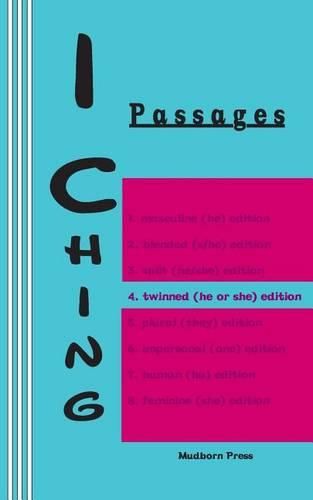I Ching: Passages 4. twinned (he or she) edition
Duke of Chou,King Wen

I Ching: Passages 4. twinned (he or she) edition
Duke of Chou,King Wen
The I Ching gives advice on how to face any life situation, requiring the seeker to cast yarrowsticks or coins to arrive at an answer. This edition offers yet another casting option, the Button Oracle (online only, at www.bandannabooks.com/iching/button.php); and, if that answer’s not enough, use the refresh button. Whether you are a believer or not, the I Ching, perhaps the world’s oldest book, stands as a remarkable document of human psychology. However, one translation problem has plagued most Western editions, which typically speak of the exceptional man or he throughout. To translate assuming that the male pronoun serves for everybody is misleading, however. Why? The language it was written in-Chinese-was, like English, nearly devoid of linguistic gender markers for its pronouns (modern Chinese has added some modifications to clarify gender). While academics tussle over, or ignore, the correct third-person-singular-of-unspecified-gender pronoun for the English language, this Mudborn Press/Bandanna Books edition offers eight gendered versions of this text for a modern audience. No, there are not eight genders. But the way that you perceive the human condition may differ from others’ views-and your own may change over time. How to choose? Answer these questions to find the version you are most comfortable with: Are you all man (using he, him, his), or all woman (she, her, hers)? Or somewhere in between (s/he, him/her, hers/his)? Do you feel like a split personality arguing with yourself (he or she, him or her, his or hers)? - or you feel plural (they, their, theirs)? Or maybe you don’t feel strongly one way or the other (asexual: one, one, one’s). Or strongly both, as in the shamanic or two-spirit tradition (he-she, her-him, his-hers). Or just as a human (hu, hum, hus). Try more than one version until you reach your comfort zone; you’ll learn about yourself as well as about the I Ching. A REMINDER: This HE version uses the traditional or old-fashioned universal he pronoun for third-person human reference where sex is not specified, or not known. The I Ching frequently speaks of a hypothetical person, the exceptional or uncommon person; it is used here quite often.
This item is not currently in-stock. It can be ordered online and is expected to ship in approx 2 weeks
Our stock data is updated periodically, and availability may change throughout the day for in-demand items. Please call the relevant shop for the most current stock information. Prices are subject to change without notice.
Sign in or become a Readings Member to add this title to a wishlist.


